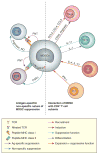Reciprocal relationship between myeloid-derived suppressor cells and T cells
- PMID: 23794702
- PMCID: PMC3694485
- DOI: 10.4049/jimmunol.1300654
Reciprocal relationship between myeloid-derived suppressor cells and T cells
Abstract
Myeloid-derived suppressor cells (MDSCs) are a heterogeneous group of myeloid cells that play a major role in the regulation of immune responses in many pathological conditions. These cells have a common myeloid origin, relatively immature state, common genetic and biochemical profiles, and, most importantly, the ability to inhibit immune responses. Although initial studies of MDSCs were almost exclusively performed in tumor-bearing mice or cancer patients, in recent years, it became clear that MDSCs play a critical role in the regulation of different types of inflammation that are not directly associated with cancer. In this review we discuss the nature of the complex relationship between MDSCs and the different populations of CD4(+) T cells.
Figures
References
-
- Movahedi K, Guilliams M, Van den Bossche J, Van den Bergh R, Gysemans C, Beschin A, De Baetselier P, Van Ginderachter JA. Identification of discrete tumor-induced myeloid-derived suppressor cell subpopulations with distinct T-cell suppressive activity. Blood. 2008;111:4233–4244. - PubMed
-
- Youn JI, Kumar V, Collazo M, Nefedova Y, Condamine T, Cheng P, Villagra A, Antonia S, McCaffrey JC, Fishman M, Sarnaik A, Horna P, Sotomayor E, Gabrilovich DI. Epigenetic silencing of retinoblastoma gene regulates pathologic differentiation of myeloid cells in cancer. Nat Immunol. 2013;14:211–220. - PMC - PubMed
Publication types
MeSH terms
Grants and funding
LinkOut - more resources
Full Text Sources
Other Literature Sources
Research Materials


